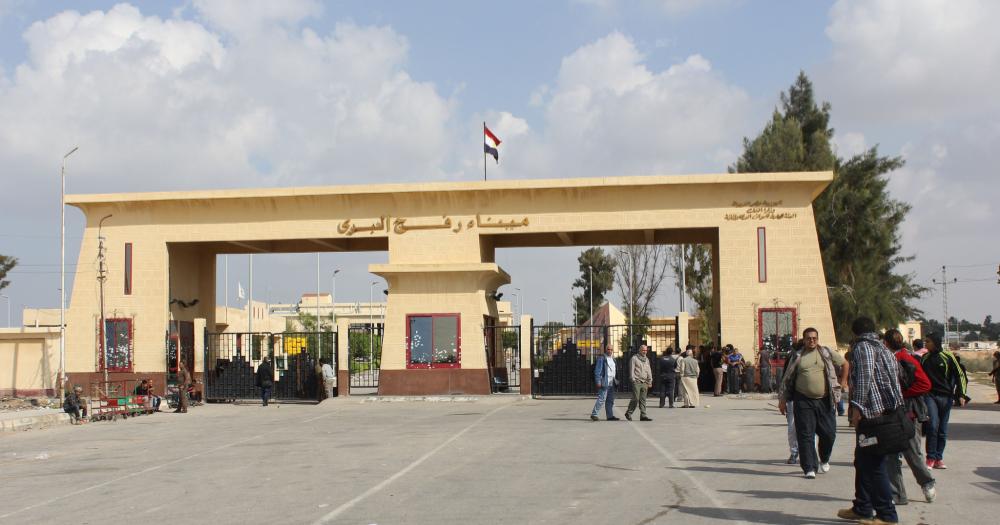Egypt has resisted calls for the establishment of a humanitarian safe corridor on its border with the Gaza Strip, but is likely to assist in providing humanitarian aid to Gaza.
No corridor
On Oct 12, Reuters reported that Egypt was resisting setting up humanitarian safe corridors, citing the right of Palestinians to "hold on to their cause and their land", citing security sources.
This is despite calls from international bodies such as the United Nations, non-governmental organisations, and even the United States to establish safe passage for civilians from Gaza.
Bloomberg cited Egyptian sources saying that the country is reluctant to let in "sizeable numbers" of refugees, citing fears that it would lead to a renewal of the idea of resettling Palestinians in the Sinai Peninsular region of Egypt.
This comes as Israel has established a "complete siege" around the Gaza Strip, which involves closing off all land borders between Israel and Gaza.
Israel has also cut off electricity, water, fuel, and food supplies to the territory.
Meanwhile the Israel Defense Forces (IDF), continue to conduct airstrikes on targets in Gaza, with mounting casualties.
Al Jazeera reported that as of Oct. 12, the death toll stands at least 1,228 Palestinians and over 1,300 in Israel.
Negotiations
The Washington Post reports that there is significant resistance within Egypt to the idea of opening the Rafah border crossing.
Rafah is the only land border not controlled by Israel, but is itself subject to tight control by the Egyptian government.
The history of the border crossing is almost as complicated as the history of the Gaza conflict itself, as reported by Al Jazeera in April 2022.
This was especially true after the 2000s, when the Palestinian Authority, whose control of Gaza was recognised by Israel, was first ousted electorally, then militarily by the militant group Hamas, who has controlled Gaza ever since.
Hamas has been in regular conflict with Israel ever since, but also has a difficult relationship with Egypt's government, particularly its military.
Hamas is aligned with Egypt's Muslim Brotherhood, who briefly held power in 2013 before it was removed in a coup by the Egyptian military.
While Egypt has voiced support for the plight of the Palestinian people, it also closely controls the border crossing and has backed Israel's blockade of the Gaza Strip since 2007.
This has resulted in Palestinian groups resorting to digging long tunnels under the border, which is used to smuggle in weapons, but also for essential items.
Humanitarian aid likely, accepting refugees less likely
Late on Oct. 11 (Oct. 12 Singapore time), United Nations Secretary-General Antonio Guterres said in a statement that Egypt had engaged constructively in facilitating humanitarian access through the Rafah border crossing.
He also thanked Egypt for making the El Arish airport available for "critical assistance".
Egyptian President Abdel Fattah al-Sisi is "intensifying efforts" to contain the situation in Gaza, Reuters reported, citing Egyptian security sources. Egypt is in talks with Qatar, Turkey and the U.S. to deliver humanitarian aid into Gaza via the Rafah crossing under a geographically-limited ceasefire.
On Oct. 12 (Singapore time), the Washington Post quoted Jeremy Hopkins, UNICEF's Egypt representative, who said that the agency was working on the understanding that a "limited humanitarian corridor" will be open soon. However, it is unclear if Egypt is willing to accept a large influx of refugees.
No agreement on safe corridor so far
The Washington Post also reported that U.S. Secretary of State Antony Blinken is travelling to Israel to meet with its government, recently re-formed as a unity government.
Asked about the possibility of allowing civilians to travel from Gaza into Egypt to escape the violence, Blinken said that the situation was "complicated".
During a press conference held at the White House on Oct. 11, National Security Council Coordinator for Strategic Communications John Kirby took questions on the possible humanitarian corridor.
Kirby said that the U.S. was actively discussing the potential corridor with both Egypt and Israel, but that there was no agreement to announce.
Related stories
Top image via Wikipedia

If you like what you read, follow us on Facebook, Instagram, Twitter and Telegram to get the latest updates.



